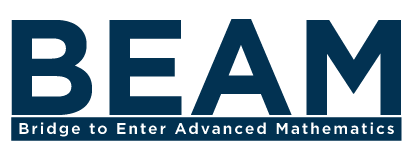About Applied Math
Welcome! We're excited that you are interested in teaching Applied Math at BEAM Discovery.
Why Applied Math?
There are two core principles behind BEAM Discovery. The first is that students should be challenged, and should be introduced to new topics and ideas that go deeper into mathematics. The second is that students should desire to continue their studies of mathematics beyond the summer, gaining the skills to pursue their interests.
At heart, we're pure mathematicians who love math for its own sake and who believe that mathematics is intrinsically beautiful. However, neither of our goals can truly be accomplished without applied math. For one thing, we will be missing key ideas in math if students do not explore how it can be used in the world. Moreover, while some students may fall in love with pure mathematics as we have, many of them will be motivated more by seeing it used in the world.
There is also one particular idea that is too important to ignore: programming. An education in programming is hugely empowering for students, and a key to their future. Moreover, a good introduction to programming can give students the tools to continue programming on their own after the summer. We want to make sure that programming is an option for all of our students.
Different Classes
A key principle of BEAM is one of choice: we believe that students are more invested in their educations when they have control over what they are learning. To that end, we would like the students to be able to choose between several different courses to find the one that excites them the most.
Teaching Applied Math is an opportunity to exercise your creativity. We don't have any set topics in mind. Instead, we encourage new ideas that will really excite the students and allow them to explore deep ideas.
We have prepackaged courses available on various topics, which have been taught at BEAM Discovery before successfully. These courses are:
Voting Theory (on choice, fairness, and voting theory)
Big Questions and Big Answers (on statistics and data with a focus on Fermi problems and estimations)
Game Theory (on game theory covering a little of both combinatorial games and rational decision making, including prisoner's dilemma)
Primes and Programming (on programming in Python and number theory)
You are also welcome to propose developing your own curriculum and teaching from that. For example, some other topics:
Programming with a different focus. We might offer multiple options within programming. The prepackaged course is a bit more series and uses Python, but other students might choose a more mellow introduction in a block-based environment such as Scratch or code.org, where they can build functional, graphical applications quickly. (The challenge with block-based programming is to make sure students are still challenged and really learning the logical flow rather than trying a bunch of things until something stick.)
Astrophysics. An astronomy or astrophysics course could talk about the positions of stars and planets and celestial navigation; it could talk about how similar triangles are used to measure the distances to stars through parallax; it could present various formulas, show some evidence for their validity, and then use them to derive more about the stars. Mathematical content would include both scientific notation, units of distance, and how to plug numerical values into formulas, all of which would be very valuable to students.
Mathematical Biology. A biology course could introduce students to genetics and do various mathematical analyses of how traits are passed down and how likely various conditions are depending on the genetic makeup of the parents. It could discuss the differences between asexual reproduction and sexual reproduction, demonstrating how genetic diversity can be increased. (Yes, there will be jokes.) It could discuss DNA, how data is encoded into DNA, and how many possibilities can exist from a single DNA strand.
Circuit Design. A circuit design course could introduce logical circuits, AND, OR, and NOT gates, and equivalences between different combinations of gates. Students could construct different gates and, after an introduction to binary, perhaps get to the point of building an adder. Actual opportunities to construct real circuits could give let them bring their ideas into the world.
Cryptography. A cryptography course could discuss modular arithmetic as well as probability when looking at the likelihood of different codes being broken. (Although, it is unlikely you'd have time to get to RSA encryption.)
In short, there are a wealth of interesting applied courses that cover deep material and are accessible to rising 7th graders.
Unlike most of the other courses, there is no specific roadmap to Applied Math. We want to see students getting excited about a topic, ideally so that they will want to pursue continued study of it in the future. Moreover, seeing how math is used directly can give them a much stronger sense for mathematics as a subject, and how it must fit together.
IF YOU’RE INTERESTED IN CREATING YOUR OWN CURRICULUM
If you’re applying to create your own curriculum rather than teach a pre-packaged course, the second step in the process will be to create a course description about how you would teach your course. For the Applied Math course, please include:
Briefly describe the course and what you would cover.
Tell us about something exciting that might happen in the classroom.
What is a problem that the students might solve? What is a project they might do?





